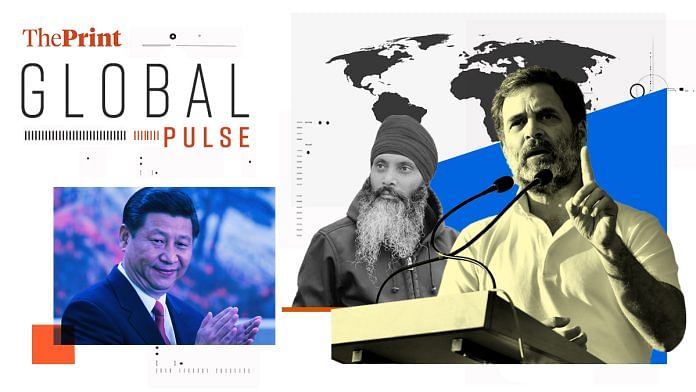New Delhi: Rahul Gandhi “wants to be a champion of Indian liberalism”, but “first, he needs to save his party from irrelevance”, says an Economist piece by journalist and novelist Rahul Bhattacharya.
“Despite being in the game for 20 years”, Rahul Gandhi “has always struggled with basics of politics: organising, cutting deals and enthusing voters”, Bhattacharya writes.
Bhattacharya also talks about Gandhi’s “appetite for the campaign trail” since his early years, and his signature “therapeutic approach”, positioning himself not only as a moral voice but also as a listener.
However, neither the old guard nor Gandhi could address the problem of “a party culture where people gained status through proximity to one Gandhi or another”, says Bhattacharya.
“To some Gandhi is a symbol of nepotistic delusion; to many a man whose legacy had trapped him in the wrong job to the detriment of the progressive cause,” adds Bhattacharya.
A New York Times report by journalists Mujib Mashal and Suhasini Raj looks into suspicions of Indian spy agency R&AW “tapping into criminal networks to carry out operations in its immediate neighbourhood” and “extending its playbook” for “operations in Western countries” now.
The context is Canadian Prime Minister Justin Trudeau’s accusation that India “orchestrated” the killing of Sikh leader Hardeep Singh Nijjar on Canadian soil, followed by the arrests of three Indians connected to the Lawrence Bishnoi gang by the Canadian authorities.
“R&AW has often been willing to venture into murky spaces to recruit killers” and senior officials of the Modi administration have been “accused of reaching into the underworld to find hit men willing to go after targets both inside the country as well as abroad”, says the report.
Another piece in the Economist, ‘Meet the maharajas of the world’s biggest democracy’, notes how Indian government offices, even those of district magistrates, “remind visitors” of a noble court, arguing that “Indians are not governed. They are ruled”.
The piece notes officials’ “special entitlements” to toll tax and airport screening exemptions result in not just their “high-handed behaviour” but also reflected in the “delivery of public services and formulation of policy”.
While Modi “has tried to make the state more effective by curbing the discretion of bureaucrats”, his reforms “have also allowed politicians to claim personal credit as benevolent monarchs”, the piece says.
Renaming Rajpath to Kartavyapath and Race Course Road to Lok Kalyan Marg are “good signals” for getting rid of the colonial baggage, but “more than language needs to change”, the piece adds.
Journalist Cherylann Mollan on the BBC News talks about the role of social media influencers in Indian politics. She highlights an influencers’ awards show organised by the Indian government before the country went to polls and content creators being offered money to interview certain politicians.
To reach the youth, election management firms have offered as much as “100,000 to 500,000 rupees for a single campaign”, says the report quoting content creators.
The report also cites University of Michigan associate professor Joyojeet Pal’s research that found more BJP leaders than opposition leaders have been featured in influencers’ interviews.
Akash Banerjee, a former journalist who runs The DeshBhakt channel on YouTube, however, argues that influencers can “push boundaries more than the traditional media can”.
Opposition parties “using the same influencer system”, however, say it “is a difficult environment”, the report says, along with a quote from Supriya Shrinate, chairperson of Congress’ social media team, saying, “Our funds have been frozen”. The report also quotes influencers “supporting the opposition” as saying that they have been “working in a hostile environment”, often becoming targets of “abusive or threatening” comments.
Yamini Aiyar, former president and chief executive of the Centre for Policy Research, writes in the science journal Nature, about academic freedom in the country and the need for a new government to prioritise research. Citing the V-Dem index, she says, “India is ranked in the bottom 20% of a list of 179 countries and territories on metrics such as ‘institutional autonomy’ and ‘freedom to research and teach’.”
“The misuse of laws to curb academic freedom has increased,” writes Aiyar, corroborating her claim with the restrictions on foreign funding, use of tax laws against institutions, difficulty in obtaining government data, and cases of faculty arrests.
Xi Jinping’s Europe visit, Al Jazeera ban in Israel
China’s President Xi Jinping and his wife, Peng Liyuan, arrived in Paris Sunday in what seems to be a strategic visit to Europe, the first in five years. Xi has chosen Hungary, France, and Serbia — countries that have in a way embraced its “push for a new global order”. To know more, read the New York Times’ report.
Benjamin Netanyahu’s cabinet has voted to suspend Al Jazeera’s operations in Israel under a law that allows the closure of foreign broadcasters if they are considered to be a security threat during the country’s war in Gaza. To know more about the law, the media’s reaction to it, and the raids that followed, read these reports by the BBC and DW.
(Edited by Madhurita Goswami)
Also read: Chinese virologist who sequenced SARS-CoV-2 barred from own lab, later allowed ‘for time being’



